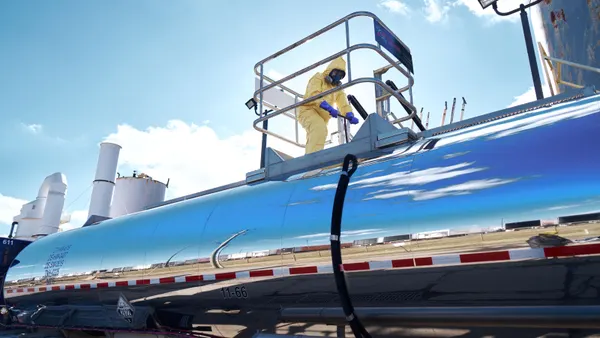UPDATE Feb. 21, 2018: The Association of Plastic Recyclers (APR) is expanding its Demand Champions Campaign around post-consumer resin based on initial success and growing interest.
President Steve Alexander said it has been "met with an overwhelming, enthusiastic response from plastic recycling stakeholders," in a statement. "One manufacturer recently indicated intent to replace 250,000 wood pallets with pallets made with PCR, leading to more than 2 million pounds of increased demand in that one application alone."
The program will now include any applications for PCR in new products, as well as "work in process" goods. Nestle, Denton Plastics, and Champion Polymer Recycling have also joined in the commitment to utilize more PCR in their products.
Dive Brief:
- The Association of Plastic Recyclers (APR) recently announced a new Demand Champion Campaign to increase the use of polyolefin postconsumer resin (PCR) in North American manufacturing.
- The campaign will focus on "Work in Process" (WIP) items such as pallets, crates, totes, drums and trash cans. All companies have to do to join is sign a commitment letter saying they'll use specific WIP items at their facilities with PCR content.
- APR's first group of Demand Champions include Berry Global, Campbell Soup, Coca-Cola North America, Envision Plastics, Keurig Green Mountain, KW Plastics, Merlin Plastics, Plastipak/Clean Tech, Procter & Gamble and Target.
Dive Insight:
APR has been active on multiple fronts recently, including a new international partnership to harmonize testing standards, and this continues that trend of collaboration. The list of partner organizations involved in this latest campaign includes many of the top names involved in plastics recycling — The Recycling Partnership, American Chemistry Council, Closed Loop Fund, Foodservice Packaging Institute, Sustainable Packaging Coalition and Plastics Industry Association. All involved have a keen interest in expanding markets and proving the viability of PCR throughout the supply chain.
As outlined in the commitment letter, this ongoing campaign will help APR gather information about what's working and where new opportunities may be available. The organization suspects PCR use may not be widespread for these products, so the goal is "to demonstrate equal functionality with an intent to implement PCR into WIP items rapidly." This also been described as a way to create a more circular economy for packaging in North America, as China prepares to potentially cut off its intake of mixed plastic scrap by the end of the year. According to APR, about 60% of U.S. polypropylene scrap is currently exported to China with no one clear market available to fill that gap. A small number of municipalities and companies have already begun to drop certain plastics from their recycling programs in states such as Wisconsin and Oregon.
Talk of creating more domestic processing capacity and demand has become even more popular since China's summer announcement, but those goals often run up against the realities of financing and permitting. By taking the approach of working with large companies to stimulate that demand — and encouraging the creation of plastic products that will have longer lifespans than more disposable items — APR may have found one of the fastest ways to begin addressing this challenge in the short-term.










